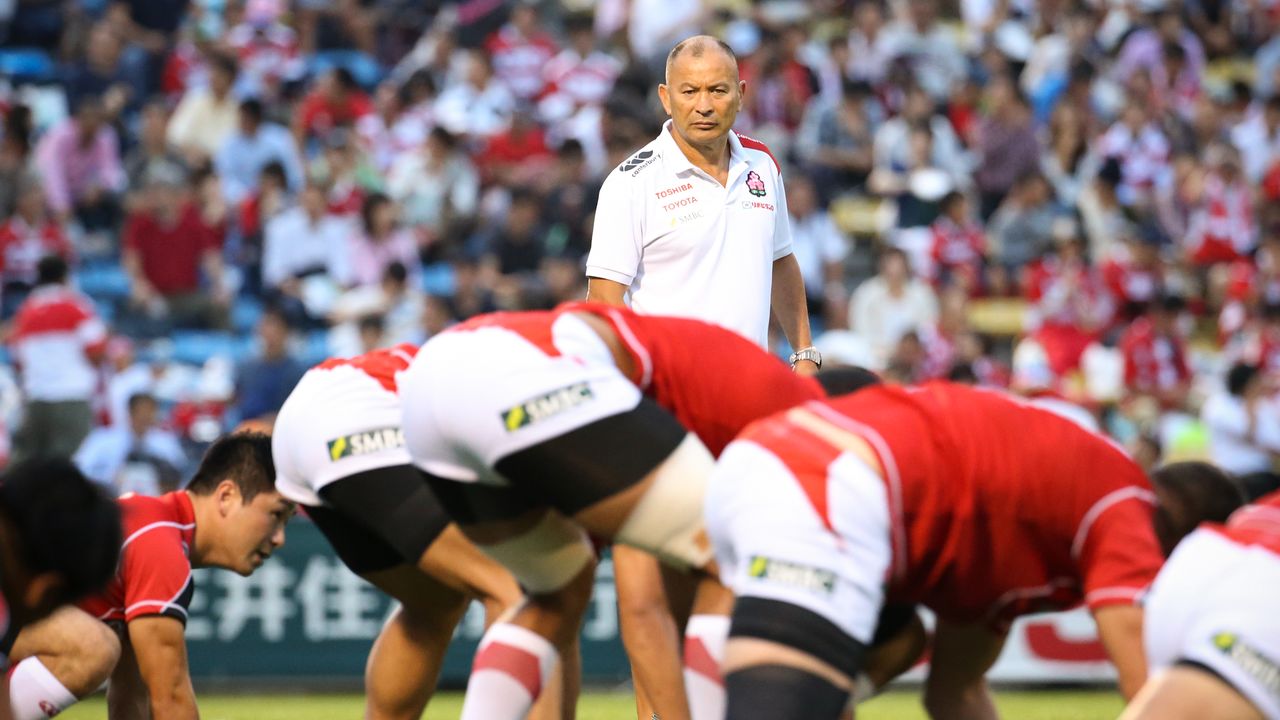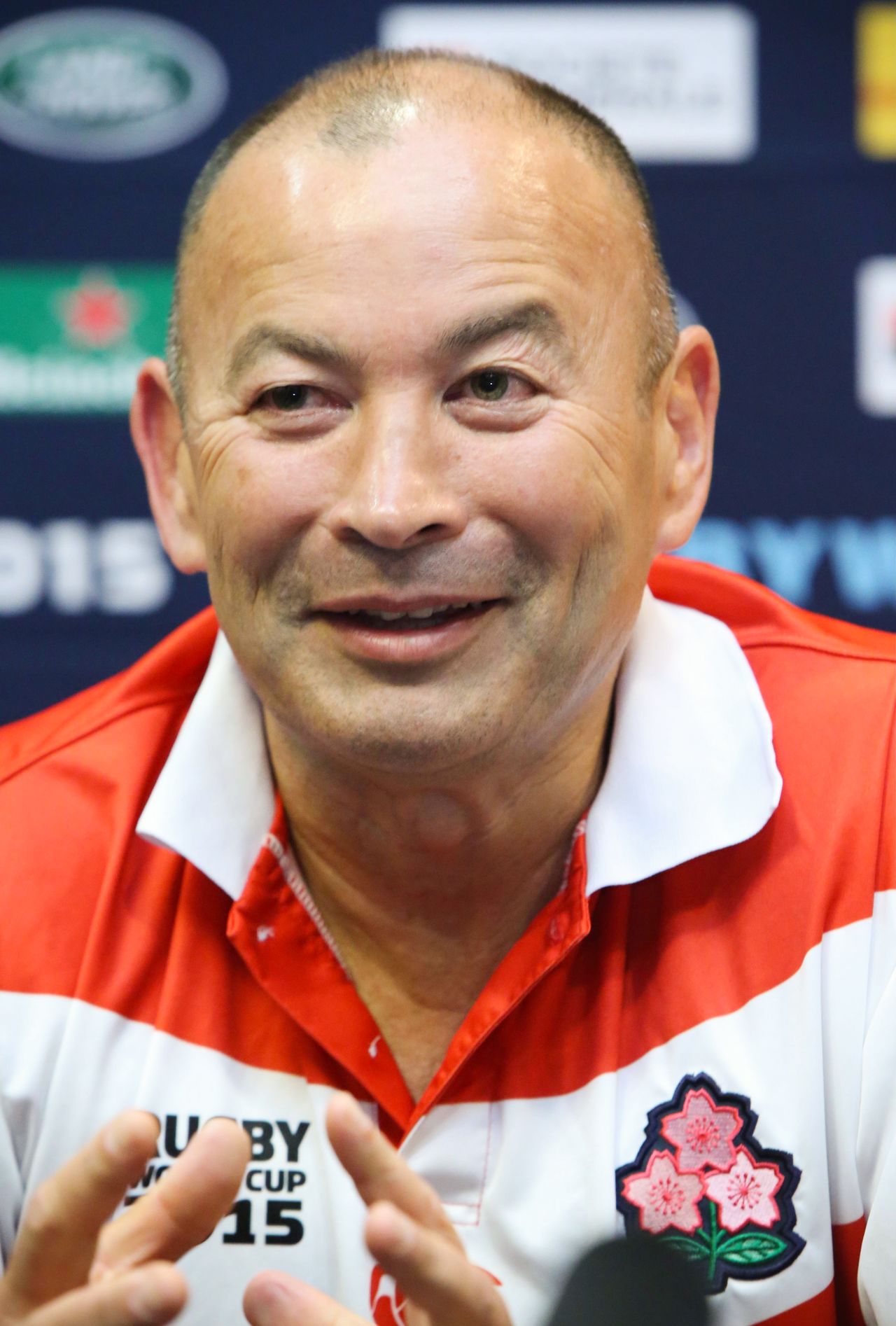
Super Coach Eddie Jones and His Impact on Japan
Sports- English
- 日本語
- 简体字
- 繁體字
- Français
- Español
- العربية
- Русский
Can it really be four years since unfancied Japan conquered South Africa, one of the giants of the global game, setting alight the Rugby World Cup 2015 in England?
Between the first World Cup in 1987 and the 2011 tournament, Japan was one of the minnows of the world game, winning just one game, against lowly Zimbabwe at the 1991 tournament, also held in England.
In 2015, the Japanese team turned that unimpressive history on its head. Although Japan lost comprehensively to Scotland just days after its heroics against the Springboks, the team went on to defeat Samoa and the United States, ending the tournament with a 3-2 winning record.

The Japanese players celebrate their historic victory over South Africa at Brighton during the 2015 World Cup in England. (Courtesy JRFU 2015, photo by H. Nagaoka. © Jiji)
Japan was the first team in World Cup history to fail to qualify for the quarterfinals despite winning three games, but rose above this disappointment to finish on a high with victory over the United States.
Before the tournament, there had been only a handful of photographers at the airport to see the team off. A few weeks later, the players returned to a heroes’ welcome, and were met by a blaze of flashing cameras and a crowd of admirers. Suddenly, everything in Japanese rugby had changed.
Eddie the Magician
Now, four years on from that unforgettable night in Gloucester, the rugby community is about to turn its attentions to Japan, where the next world cup gets underway at the end of September.
What happened to change the fortunes of the Japanese team four years ago? Any attempt to answer this question leads eventually to Eddie Jones, the head coach at the time.
In 2015, I put together a book called Edī Jōnzu to no taiwa (Conversations with Eddie Jones). I had numerous opportunities to get to know Eddie-san (as Japanese sports writers used to call him) well and hear his inspiring ideas at firsthand.
Today, Jones is busy preparing for the next World Cup as head coach of England, but it is not difficult to discern lingering evidence of his time in Japan. Jones’s impact has made itself felt beyond the rugby world, and has been particularly profound in the business culture.
Eddie Jones was a magician with words. He would be a natural in advertising, with a world-beating talent for producing copy. During his time in charge of the national team, he singlehandedly popularized a number of phrases and made them an integral part of the nation’s business and sporting culture.
Head Start
In training camp, players were set to work on weight training from five in the morning. This brought dramatic changes in body size and physique and muscle mass—so much so that some players had to go up a jersey size.
Hard Work
Jones was unforgiving of any player who failed to give 100 percent—not just during matches, but in every training session as well.
Resilience
Jones drove his players to their physical and mental limits, hoping to provoke a response that would make them stronger.
Repeat Your Message till You’re Blue in the Face
The success of the Japanese team in England saw several of the key phrases of the Eddie Jones philosophy taken up like catchphrases by high school and university teams throughout Japan. But not all coaches were able to profit from these magic charms. Improvements only came when coaches managed to get the message across to their players.
Why was the Japanese team so successful in this regard?

Eddie Jones during his time as head coach of Japan, during the Rugby World Cup in England. Photo taken on September 7, 2015, in Brighton. (© Jiji)
During his time as coach, once Jones had decided on the message he wanted to communicate, he would repeat it over and over, until he was certain the message was getting through. As he said once during an interview: “At the start of a new season, teams and coaches come up with new slogans and phrases. But coming up with ideas is easy. The hard part is getting the message across, making sure the catchphrases penetrate. The trick is to keep it simple. Rugby’s a game of communication. You need a phrase that the players can embrace and make their own out on the paddock. Most importantly, the leaders of the group have to persevere in repeating the message over and over. You have to keep saying it till you’re fed up of hearing it.”
Do You Want to Play with Your Phone or Play Rugby?
In June 2018. I watched Jones take a training session of high school players in Okinawa. It was an opportunity to witness his methods at first hand. Before training practice started, he told the players: “Rugby is a game of communication. I want to see you talking to each other and communicating with your teammates.”
After watching the players train for 15 minutes, Jones suddenly brought the session to a halt and gathered the players together. “You’re not talking! You look like you’d be happier back in the sheds tapping away at your phones and playing video games. Is that what you want? Do you want to play with your phones or stay out here communicating with each other and playing rugby? You need to make up your minds now what you want to do.”
Not one of the young players left the training ground.
“Right. You have all chosen to stay out here and train—that was your own decision. Let’s get back to it.” As soon as practice resumed, the training field was filled with the sound of players shouting and calling to one another, the session transformed into one of energetic communication. The voices didn’t let up until the session came to an end.
One reason, I believe, why Eddie Jones is so successful at communicating with his players and asking probing questions is his voracious appetite for reading. When I was working on my book with him, he recommended numerous titles that he has drawn on for inspiration in his work.
One he spoke about with particular enthusiasm was by Malcolm Gladwell, the New Yorker writer. “I was really inspired by Gladwell’s book David and Goliath. The book analyzes famous upsets from throughout world history. Basically, he says, the key is to change your way of thinking. How could Japan manage to defeat South Africa? Reading Gladwell’s book opened my mind to new ways of thinking about that question.”
Impact on the Business World
One fascinating aspect of Jones’s influence in Japan is that it has gone far beyond rugby and been taken on board by figures from the wider world of business.
One reason is that Jones’s approach has a lot in common with the methodologies used by business leaders. Jones made effective use of business methods in his team management. For example, coaches would propose training plans and give presentations to Jones, and then put the plans into practice after getting approval and permission from the head coach. If the purpose of training or the details of the presentation were not clear, the coaches would be kept behind to put in overtime. The players were not the only ones kept on their toes. Hard work was demanded of everyone on the coaching staff too.

Eddie Jones as the face of Mitsukoshi-Isetan’s spring 2016 advertising campaign, adorning the facade of the Mitsukoshi department store in Ginza, Tokyo. (© Jiji)
These methods provided inspiration in turn to managers in Japanese companies, who were impressed by his knack for coining phrases and ensuring that they penetrated to all members of a team.
These managers adapted Jonesian concepts like “head start, hard work, and resilience” to suit the culture and conditions of their own companies, and worked on ways to get them through to employees. Interestingly, many of the managers who were most enthusiastic about incorporating Jones’s ideas had played rugby themselves as students in the 1980s.
Some companies tried to tap his powers of persuasion more directly. After the World Cup, he served on the advisory board of Goldman Sachs Japan, and appeared in advertising for Mitsukoshi-Isetan department stores and Fuji Xerox, among others.
One publishing firm encouraged employees to get an “early start” by coming into work at eight, and took steps to make drawn-out meetings more productive by holding them first thing in the morning. To compensate, employees were allowed to go home early on these days, and the company worked to ensure that they were given enough free time to pursue outside interests. This led to an understanding among employees of the concept that hard work did not necessarily entail long hours, but could mean putting in concentrated bursts to improve work efficiency.
Perhaps not coincidentally, the biggest sales of my book of Conversations with Eddie Jones came from the Marunouchi branch of a major bookstore chain—right in the heart of Tokyo’s central business district.
Pushing Players to Surpass Themselves
Jones believes that part of the reason for his success with the Japanese team came from taking advantage of typical Japanese characteristics. “Japanese people tend to have a strong work ethic and perseverance. I think by pushing them hard we succeeded in bringing out their potential. Individuals developed self-belief and the confidence to make good decisions—and that ultimately was what led to those positive results at the World Cup.”
Even now, after Jones has moved on from his time in Japan, the words and phrases he left behind continue to have an impact in the Japanese business world. And in rugby circles, there are still many players who served their apprenticeship under his guidance.
In November 2018, Japan played against England at Twickenham, the spiritual headquarters of the global game. The Japanese fought valiantly and even led at half-time. After the game, Jones remarked: “Japan has arrived as a top rugby-playing nation now, playing in a Test Match against England at Twickenham. They’re a much stronger side than when I coached them.”
How will the Brave Blossoms fare when the Rugby World Cup starts in Japan at the end of September? If the team achieves the success its supporters are hoping for, the lingering influence of Eddie Jones will undoubtedly be part of the reason.
(Originally published in Japanese on April 19, 2019. Text by Ikushima Jun. Edited by Sainowaki Keiko.)

